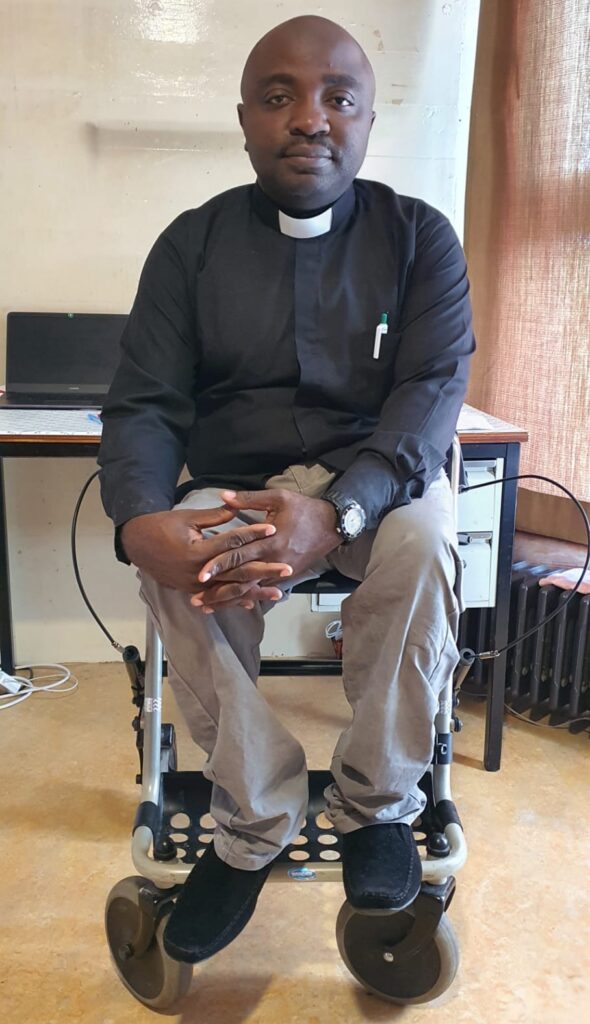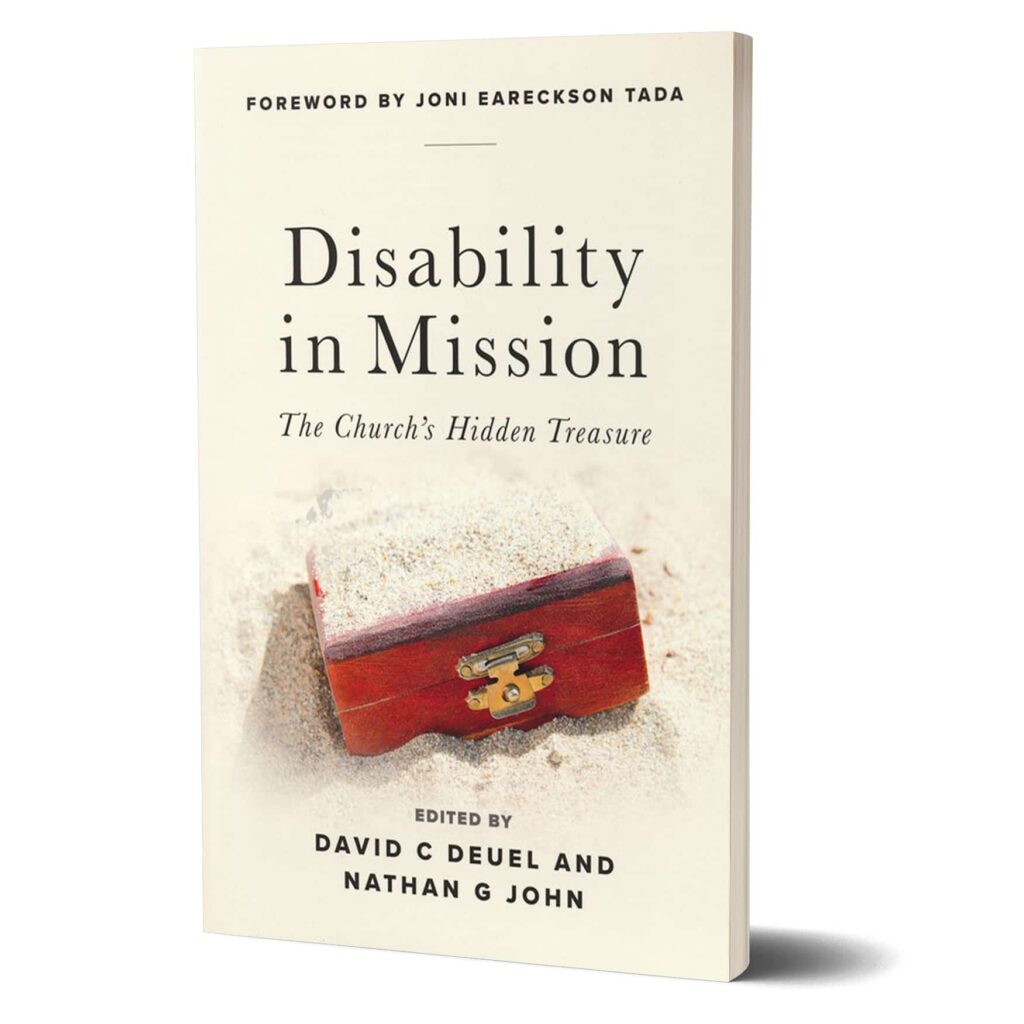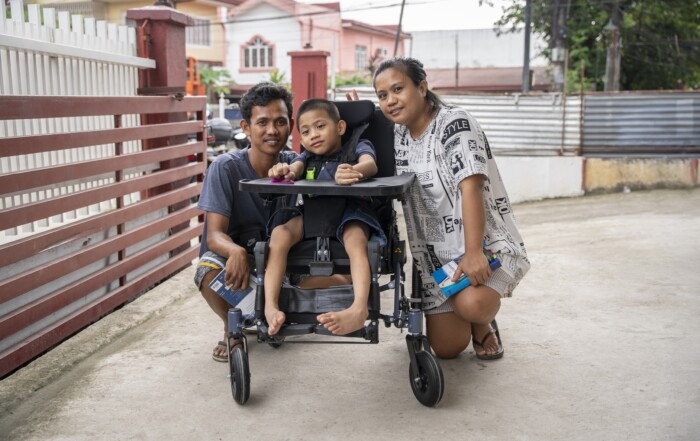When Disability Meets Agape
Q&A with Dr. Daniel Kyungu Tchikala
In today’s Q&A format, we have the joy of hearing from Dr. Daniel Kyungu Tchikala, a social scientist from the Democratic Republic of Congo (DRC), whose research has focused on the social and political integration of people with disabilities in his country. He can personally relate because he himself is affected by a physical disability.
As he will attest, it has not been easy, but hearing his story is both inspiring and challenging.
In this Q&A, Dr. Kyungu shares about everyone’s need for social interaction and about how the global church should be – must be – intimately involved for agape connections to become a reality. Such love will revitalize all, whether someone is living in Southern California or in the DRC, where disability is dangerous.

However, before we begin the Q&A, let us explain Dr. Kyungu’s Lausanne connection, which plays a vital role in not only his personal life and ministry but also in every article posted on this blog, even if only subtly. This Disability in Mission blog is connected to both Joni and Friends as well as to the Disability Concerns Network of the Lausanne Movement. As a global evangelical movement, Lausanne began in the 1970s by those like Billy Graham and John Stott. Joni Eareckson Tada herself was the first catalyst for Lausanne’s Disability Concerns Network, a network that advocates for local churches around the world to disciple, train, and include members with disabilities in leadership roles. In addition, the three editors of Disability in Mission play a key part in this network. Kevin Avery, who is one of these editors, is leading today’s interview.
Q: Dr. Kyungu, thank you for blessing us today. Earlier, you mentioned being from the DRC in Africa. According to opendoors.org, the eastern part of the DRC is a dangerous place for Christians to live. May I ask where you live in the DRC?
A: Indeed, the eastern part of our country faces threats from terrorist groups, including an extremist Islamic group that openly attacks Christians and churches. I live in the south of the country, in the city of Lubumbashi, not far from the border with Zambia. I do not face Islamist persecution, but I do face other forms of persecution due to my Christian faith. I am not at liberty to give specifics, but when pressured to do anything that goes against our faith, I remain attached to Jesus Christ and him only – even when it costs me dearly.
Q: I am very sorry to hear that you face any kind of persecution, but I’m glad you live in a safer area near Zambia. May the Lord continue to give you strength, and may he protect the believers living to the east. I’m thankful you’ve been able to become an active member of Lausanne. It’s so important to have strong Christian support, but I am curious, how is it that you first learned about the Lausanne Movement?
A: I became familiar with Lausanne thanks to my mentor, Dr. Dave Deuel. It is an exceptional grace for me to be integrated into a team of people who love God and who serve him well. I will also say thanks to disability, which is what led me to this opportunity. We find God’s grace everywhere, even in the handicap.
Q: Amen, but may I ask how a disability provided this opportunity?
A: As you have said, human weakness can be used for the glory of God. God often uses disability or suffering. It’s how I became a Christian. Although I was born into a Christian family, I never received Jesus Christ until I experienced the love of Christ through disability. It was at the age of 14. My struggles had put me into deep anguish, but the Lord met me where I was, and I began to have immense joy from our Lord and Savior. It was at this point that I received salvation and promised my life to God.
Also, it was because of disability that I first met my mentor on LinkedIn. Based on my mentor’s experiences in Christian ministry among people with disabilities, he saw that I had great promise. He believed that I could be coached to participate in global mission, even as a leader. Far from asking me questions such as “What are you able to do?” or “What can’t you do because of your handicap?” – my mentor saw me as an empowered child of God. Thanks to his agape love and the Holy Spirit, my mentor saw that I could be a valuable minister of the gospel. He was the one who connected me to the Lausanne Movement, and it is he who recommended me to serve as a young leader for Lausanne.
Q: Amen. What a beautiful testimony! I recognize, though, there’s some pain behind these words. Has it been unusual for others to see you beyond your limitations, even though you have a doctorate degree?
A: Disability is often the dominant characteristic in the process of recruiting people with disabilities. It supersedes skills or character. Most are excluded from the recruitment process even before being assessed. I have been a victim of it several times, so it’s amazing to be able to meet a person who is interested in you – just you, disability aside. It is an exceptional attitude. I think the world should stop nurturing what is not true when it comes to people with disabilities. These individuals should be given a chance to demonstrate who they are and what they will add to the team instead of dwelling on the limitations of the disability.
Q: Amen! The aim to give everyone an opportunity – a platform – to grow in Christ and to minister to others is a key focus of both Joni and Friends and Lausanne’s Disability Concerns. Has your research highlighted effective ways to integrate those with disabilities into the church?
A: In my country, it is very rare to meet anyone with disabilities in the church, even when they live close by a local church. So since it is already very rare to find people with disabilities among church members, it is almost impossible to meet them in leadership roles. This is not because they do not have the necessary spiritual leadership gifts or skills. It is because they are stigmatized, even when church members aren’t associating the disability with witchcraft like the general population does.
Q: Witchcraft?
A: Yes, disability is associated with witchcraft in my country and in other African nations as well. It is very dangerous since witchcraft is punishable by capital punishment, determined by popular justice, and the State does nothing. I personally have been robbed by a neighbor and had no choice but to silently accept it. To complain adds injury. When interviewing individuals for my dissertation, I learned of many worse accounts. So as a Christian leader with a disability – especially in my country – I am aware of the grace the Lord has given me. Up to this day, my experience has been an anomaly.
But let me go back to your question about integration and the church. The research in my home country has not offered hopeful suggestions, but just recently, I experienced an amazing glimpse of what can be – a glimpse of an agape community of faith. In the Lausanne Movement, I met a wonderful group united by a passion for the gospel and discipleship. They are a people characterized by agape. My integration quickly became a reality, and I was chosen to travel to California and join other selected leaders from around the world.
A few minutes after my arrival at the airport, I saw a woman whose face resembled that of my sister in Christ, whom I had seen several times before on my computer screen. Once I built up enough courage to shout “My sister!” in her direction, she turned and greeted me with such warmth, reassuring me that my reduced mobility had no power to displace my joy or social integration. She took my suitcase and led me to meet the other team members eagerly waiting for me on the other side. After receiving many more hugs, I clearly knew I was – and still am – an integral part of this international team of agape! As Jesus says in John 13:35, we will be known as his disciples if we love one another.
Q: Wow, this paints such a beautiful picture of what can be. The remaining question, then, is how can we – the global church – give such attention to Christ’s agape, truly becoming the hands and feet of Christ, where even the weakest member is indispensable? I think we all want such a reality, but many will ask: Is this achievable?
A: Yes, it can become a reality even in a country like mine, the Democratic Republic of Congo. It won’t be easy. Human research – and likely many church goers as well – will say this pursuit is impossible, but we can trust God’s Word. In Matthew 19:26 (NIV), “Jesus looked at them and said: ‘With man this is impossible, but with God all things are possible.’” If all the brothers and sisters, animated by agape love, rise up and compassionately bring people with disabilities into our churches and our meetings as vital members – as future leaders – then, the great story of God will only get better and better. Together, we will all sing “To God Be The Glory!” in every language. Amen!
And thus, it can be said: When disability meets agape, that handicap begins to lose all its power, and the path to integration is easy.

Disability in Mission
Disability in Mission: The Church’s Hidden Treasure outlines a radical change in approaches to missiology, missions, and praxis for the twenty-first-century global cultural context. It explores a pattern whereby God works powerfully in missions through disability and not in spite of it.





